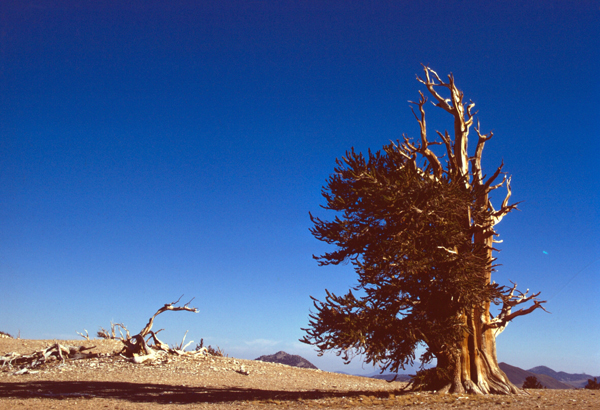
What's the Oldest Living Organism?

For most creatures, life is fleeting. An adult mayfly lives only 30 minutes. Humans make it an average of only 60 or 70 years; the current record holder is a woman who lived to 122 years. Galapagos tortoises top out at 190 years; some whales somewhere around 200. But for plants, life can stretch out many times that of animals. Trees often live for hundreds of years, with some truly ancient specimens standing sentry for millennia.
The oldest known living organism is a bristlecone pine that grows in south eastern California's White Mountains, according to ecologist Christopher Earle's online database of conifers. A count of the tree's rings confirms that Methuselah, as the tree is affectionately known, is 4,841 years old. That's older than most of human civilization: Methuselah sprouted during the Bronze Age, some two millennia before Rome was founded and a few hundred years before Egyptians constructed the Great Pyramid of Giza.
It's not uncommon for bristlecones to reach such an advanced age. According to the U.S. Forest Service, trees like Methuselah experience exceptionally slow growth in cold temperatures, which makes their wood dense and resistant to disease. Scientists have shown that bristlecones change little as they grow older, and may not deteriorate with age the way other plants and organisms do.
Of course, getting to your 4,841st birthday takes a little luck. A bristlecone pine more than 100 years older than Methuselah was discovered in 1964 by researchers in Nevada. But its age, about 4,900 at the time, was only discovered after the tree, now called Prometheus, was cut down. For this reason, the Forest Service keeps Methuselah's exact location secret from the public. According to Earle's database, it is likely that bristlecone pines more than 5,000 years old exist, but it may not be possible to measure their age because old trees can lose their bark, allowing early rings to be worn away by wind and weather.
Other species of trees grow even older than the bristlecone, but they need to cheat to get there: Certain species produce clones of themselves, with several generations of offshoots living out successive lifetimes from the same root system. According to Swedish scientists, a spruce tree in the Dalarna province of Sweden is the latest in a string of genetically identical clones stretching back 9,550 years. In southern Utah, a group of quaking aspen clones has been aged at 80,000 years, according to the U.S. Forest Service, though none of the individual trees make it much past 75.
Sign up for the Live Science daily newsletter now
Get the world’s most fascinating discoveries delivered straight to your inbox.










